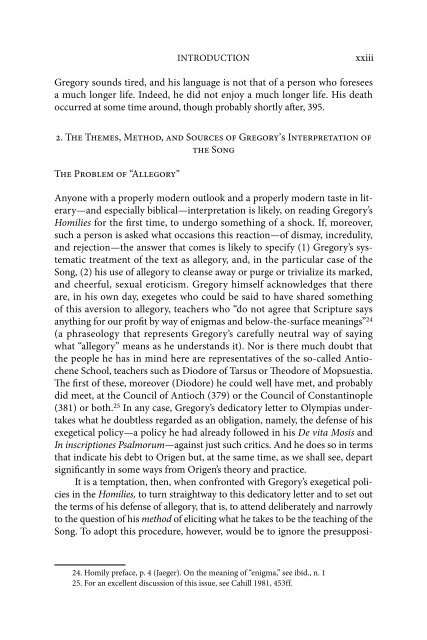gregory of nyssa: homilies on the song of songs - Society of Biblical ...
gregory of nyssa: homilies on the song of songs - Society of Biblical ...
gregory of nyssa: homilies on the song of songs - Society of Biblical ...
Create successful ePaper yourself
Turn your PDF publications into a flip-book with our unique Google optimized e-Paper software.
INTRODUCTION xxiii<br />
Gregory sounds tired, and his language is not that <str<strong>on</strong>g>of</str<strong>on</strong>g> a pers<strong>on</strong> who foresees<br />
a much l<strong>on</strong>ger life. Indeed, he did not enjoy a much l<strong>on</strong>ger life. His death<br />
occurred at some time around, though probably shortly after, 395.<br />
2. The Themes, Method, and Sources <str<strong>on</strong>g>of</str<strong>on</strong>g> Gregory’s Interpretati<strong>on</strong> <str<strong>on</strong>g>of</str<strong>on</strong>g><br />
<strong>the</strong> S<strong>on</strong>g<br />
The Problem <str<strong>on</strong>g>of</str<strong>on</strong>g> “Allegory”<br />
Any<strong>on</strong>e with a properly modern outlook and a properly modern taste in literary—and<br />
especially biblical—interpretati<strong>on</strong> is likely, <strong>on</strong> reading Gregory’s<br />
Homilies for <strong>the</strong> first time, to undergo something <str<strong>on</strong>g>of</str<strong>on</strong>g> a shock. If, moreover,<br />
such a pers<strong>on</strong> is asked what occasi<strong>on</strong>s this reacti<strong>on</strong>—<str<strong>on</strong>g>of</str<strong>on</strong>g> dismay, incredulity,<br />
and rejecti<strong>on</strong>—<strong>the</strong> answer that comes is likely to specify (1) Gregory’s systematic<br />
treatment <str<strong>on</strong>g>of</str<strong>on</strong>g> <strong>the</strong> text as allegory, and, in <strong>the</strong> particular case <str<strong>on</strong>g>of</str<strong>on</strong>g> <strong>the</strong><br />
S<strong>on</strong>g, (2) his use <str<strong>on</strong>g>of</str<strong>on</strong>g> allegory to cleanse away or purge or trivialize its marked,<br />
and cheerful, sexual eroticism. Gregory himself acknowledges that <strong>the</strong>re<br />
are, in his own day, exegetes who could be said to have shared something<br />
<str<strong>on</strong>g>of</str<strong>on</strong>g> this aversi<strong>on</strong> to allegory, teachers who “do not agree that Scripture says<br />
anything for our pr<str<strong>on</strong>g>of</str<strong>on</strong>g>it by way <str<strong>on</strong>g>of</str<strong>on</strong>g> enigmas and below-<strong>the</strong>-surface meanings” 24<br />
(a phraseology that represents Gregory’s carefully neutral way <str<strong>on</strong>g>of</str<strong>on</strong>g> saying<br />
what “allegory” means as he understands it). Nor is <strong>the</strong>re much doubt that<br />
<strong>the</strong> people he has in mind here are representatives <str<strong>on</strong>g>of</str<strong>on</strong>g> <strong>the</strong> so-called Antiochene<br />
School, teachers such as Diodore <str<strong>on</strong>g>of</str<strong>on</strong>g> Tarsus or Theodore <str<strong>on</strong>g>of</str<strong>on</strong>g> Mopsuestia.<br />
The first <str<strong>on</strong>g>of</str<strong>on</strong>g> <strong>the</strong>se, moreover (Diodore) he could well have met, and probably<br />
did meet, at <strong>the</strong> Council <str<strong>on</strong>g>of</str<strong>on</strong>g> Antioch (379) or <strong>the</strong> Council <str<strong>on</strong>g>of</str<strong>on</strong>g> C<strong>on</strong>stantinople<br />
(381) or both. 25 In any case, Gregory’s dedicatory letter to Olympias undertakes<br />
what he doubtless regarded as an obligati<strong>on</strong>, namely, <strong>the</strong> defense <str<strong>on</strong>g>of</str<strong>on</strong>g> his<br />
exegetical policy—a policy he had already followed in his De vita Mosis and<br />
In inscripti<strong>on</strong>es Psalmorum—against just such critics. And he does so in terms<br />
that indicate his debt to Origen but, at <strong>the</strong> same time, as we shall see, depart<br />
significantly in some ways from Origen’s <strong>the</strong>ory and practice.<br />
It is a temptati<strong>on</strong>, <strong>the</strong>n, when c<strong>on</strong>fr<strong>on</strong>ted with Gregory’s exegetical policies<br />
in <strong>the</strong> Homilies, to turn straightway to this dedicatory letter and to set out<br />
<strong>the</strong> terms <str<strong>on</strong>g>of</str<strong>on</strong>g> his defense <str<strong>on</strong>g>of</str<strong>on</strong>g> allegory, that is, to attend deliberately and narrowly<br />
to <strong>the</strong> questi<strong>on</strong> <str<strong>on</strong>g>of</str<strong>on</strong>g> his method <str<strong>on</strong>g>of</str<strong>on</strong>g> eliciting what he takes to be <strong>the</strong> teaching <str<strong>on</strong>g>of</str<strong>on</strong>g> <strong>the</strong><br />
S<strong>on</strong>g. To adopt this procedure, however, would be to ignore <strong>the</strong> presupposi-<br />
24. Homily preface, p. 4 (Jaeger). On <strong>the</strong> meaning <str<strong>on</strong>g>of</str<strong>on</strong>g> “enigma,” see ibid., n. 1<br />
25. For an excellent discussi<strong>on</strong> <str<strong>on</strong>g>of</str<strong>on</strong>g> this issue, see Cahill 1981, 453ff.
















